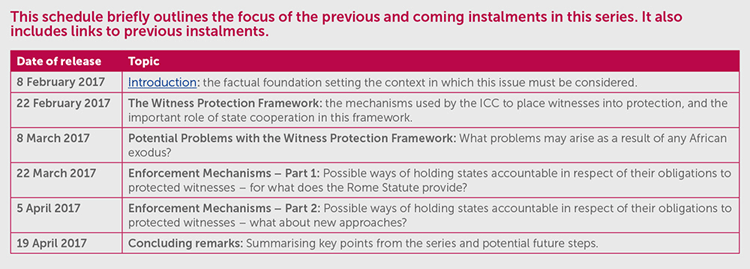Protecting witnesses, protecting the ICC
Invitation to comment
The Portfolio Committee on Justice and Correctional Services is currently inviting public comments on The Implementation of the Rome Statute of the International Criminal Court Act Repeal Bill and Related International Instruments Bill [B23-2016]. The Bill aims to repeal the Implementation of the Rome Statute of the International Criminal Court Act, No 27 of 2002, by which South Africa bound itself to the obligations under the Rome Statute. Members of the public are also invited to comment on the declaration of the decision to withdraw from the ICC and the explanatory memorandum to that withdrawal. The deadline for comments is 8 March 2017. They can be emailed to vramaano@parliament.gov.za
The Witness Protection Framework
Article 43(6) of the Rome Statute of the International Criminal Court provides for a victims and witnesses section (VWS) within the Registry of the ICC. The VWS is responsible for, among other things, the provision of “protective measures and security arrangements” for witnesses who are at risk on account of their testimony before the Court. Under article 68(1), the Court itself also has a duty to take appropriate measures to protect the safety, physical and psychological well being, dignity and privacy of witnesses.
The ICC’s obligations are partially fulfilled through the operation of the ICCPP. The precise manner in which it operates is confidential; however, regulation 96(3) the ICC Registry Regulations (ICC-BD/03-03-13) does provide some guidance on the criteria for participation in the programme. The VWS must consider:
(1) the involvement of the witness before the Court;
(2) whether the witness or her family is endangered because of her involvement with the Court; and
(3) whether the witness agrees to enter the ICCPP.
Rule 16(4) of the ICC Rules of Procedure and Evidence (ICC ASP/1/3) provides for the negotiation of relocation agreements for witnesses who are at risk on account of their testimony before the Court.
Although the ICC actively pursues a policy of concluding relocation agreements with States Parties and non-States Parties, it has also made it clear that relocation of witnesses, particularly international relocation, is always a last resort due to the extent of the physical and psychological upheaval for the witness and her family (see Katanga). Once relocated, the protective states are expected to provide assistance with comprehensive resettlement programmes.
The Court maintains contact with relocated witnesses as long as necessary and tends to work in partnership with the protective states to achieve full integration of the relocated protected witnesses and their families. However, it remains the protective state’s responsibility to maintain effective protection of the witness and her family, with the ICC merely monitoring that protection (see Summary Report).
Relocation is only achieved by agreement between the ICC and the protective states. Therefore, it is critical to understand the conceptual difference between framework relocation agreements and actual relocation agreements.
In terms of framework relocation agreements, the contracting states agree that they may agree to receive witnesses under the ICCPP in the future – there is no commitment or obligation to take any particular witness, or witnesses generally, from any country, and the ICC cannot compel them to do so. Actual relocation agreements are the agreements that the Court enters into in respect of actually relocating specific witnesses to the contracting state, whether in terms of a previously concluded framework relocation agreement, or as an ad hoc agreement.
The Importance of State Cooperation
As illustrated, the ICCPP is based on voluntariness (in terms of entering into relocation agreements) and the cooperation of states (in terms of fulfilling obligations under those agreements). Given this state of affairs, any failure by states to cooperate in a meaningful way is extremely problematic: according to a former Registrar of the ICC, it is one of the biggest threats to the adequate protection of witnesses.
Framework relocation agreements help to facilitate future cooperation requests to states. The importance of these agreements is emphasised by the fact that the Court’s Strategic Plan includes the goal of increasing the number of framework relocation agreements entered into with states. However, as expressed by Human Rights Watch, “a central challenge with regard to cooperation and support is converting broad proclamations into policy and practice”.
The ICC has entered into 17 framework relocation agreements to date. In total, and in terms of the Court’s 2017 proposed budget, there are currently 575 people in the ICCPP (comprising 110 witnesses and 465 dependents). It is predicted that more than 110 witnesses will remain under the ICC’s protection in 2017 (which figure includes 49 internationally-relocated witnesses who are in the care of a protective state but being monitored by the VWS) and a further 14,100 individuals will apply for protection. With so few framework relocation agreements in place (considering that there are 124 States Parties), this puts enormous strain on the states who are more willing to cooperate and on the VWS itself.
This paucity of framework relocation agreements affects the ability of the VWS to ensure adequate protection of witnesses, which is essential to the proper and efficient functioning of the Court. Further, the goal of integrating witnesses as seamlessly as possible into their new society (through an attempt to match cultures) is difficult to achieve without a diverse network from which to choose the protective state.
An International Bar Association report previously identified a particular need for framework relocation agreements in Africa, largely because the majority of situations currently before the Court originate on the continent. In March 2016, an official of the Court confirmed that African participation in witness relocation is “very good”. As a more general point, the more framework relocation agreements that are in place, the more difficult it will be for ill-intentioned governments and non-state actors to determine where relocated witnesses may live.
It should now be apparent that the ICCPP’s reliance on state cooperation has rendered it overly reliant on the willingness of a few states to take on the protective role. With a greater understanding of the witness protection framework and the role of state cooperation, it is now possible to consider issues that may be raised by the potential African walkout in the next alert.
This schedule briefly outlines the focus of the previous and coming instalments in this series. It also includes links to previous instalments.

The information and material published on this website is provided for general purposes only and does not constitute legal advice. We make every effort to ensure that the content is updated regularly and to offer the most current and accurate information. Please consult one of our lawyers on any specific legal problem or matter. We accept no responsibility for any loss or damage, whether direct or consequential, which may arise from reliance on the information contained in these pages. Please refer to our full terms and conditions. Copyright © 2026 Cliffe Dekker Hofmeyr. All rights reserved. For permission to reproduce an article or publication, please contact us cliffedekkerhofmeyr@cdhlegal.com.
Subscribe
We support our clients’ strategic and operational needs by offering innovative, integrated and high quality thought leadership. To stay up to date on the latest legal developments that may potentially impact your business, subscribe to our alerts, seminar and webinar invitations.
Subscribe




